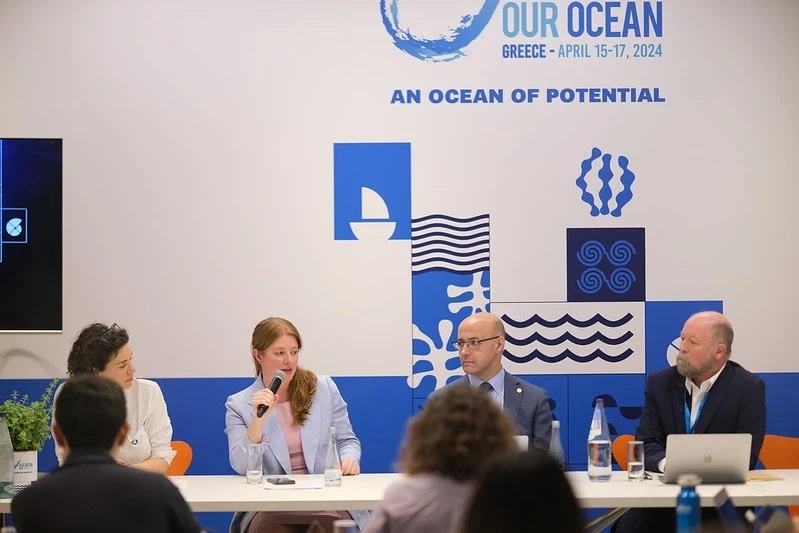Conservation and sustainable use of marine and ocean resources is a common concern of many countries and is also on the agenda of many multilateral organisations and forums. The ocean’s “health” is facing increasingly serious threats, and this effort requires cooperation from the international community.

The 9th Our Ocean Conference. (Photo: ourocean2024.gov.gr).
Covering about 70% of the Earth’s surface, oceans play an essential role in nature and human life. As the “lungs” of the planet, the ocean is the source of most of the oxygen in the atmosphere. Absorbing the majority of the excess heat from global warming, the ocean contributes to “softening” the effects of climate change. Many economies, activities and fields, from fisheries to tourism and international transportation, depend on the oceans.
While playing such an important role, the ocean suffers severe consequences due to waste pollution or unsustainable tourism and shipping activities. Illegal and uncontrolled fishing depletes resources and destroys ecosystems. Oceans also bear the brunt of the negative impacts of climate change, such as coral bleaching, warming temperatures and rising sea levels.
According to the European Union’s (EU) Copernicus climate agency, the average ocean surface temperature in March “overtook” the record high recorded in February.
The oceans are “suffocating” as temperatures regularly reach record highs. That is the warning of the Director General of the United Nations Educational, Scientific and Cultural Organization (UNESCO), Audrey Azoulay, at a conference on ocean protection in the Spanish city of Barcelona. Azoulay said many measures were implemented to protect the ocean, but there is still much work to be done, and this can be done. Therefore, she called on countries to continue investing in science to promote common efforts despite the current complicated international context.
The 9th Our Ocean Conference, which has recently taken place in the Greek capital, Athens, attracted the participation of a large number of delegates from 130 countries and organisations, showing the interest of the international community in the responsibility to protect the ocean. At the Conference, Prime Minister of the host country Kyriakos Mitsotakis expressed concern that the ocean was sending “painful signals”. Saying that measures to reduce negative impacts on the ocean are not enough, Mitsotakis called on countries to focus on protection and recovery efforts.
Greek Foreign Minister George Gerapetritis also called on countries to launch specific initiatives to address issues of current top concern, such as responding to climate change, building marine protected areas, promoting a sustainable fishing and seafood industry, developing a blue economy, ensuring maritime safety and handling marine environmental pollution.
This year’s Our Ocean Conference ended with mobilising nearly 500 commitments worth about 10.8 billion EUR. In particular, the EU made 40 commitments worth about 3.5 billion EUR for a series of initiatives to combat marine pollution, support sustainable fisheries and invest in the blue economy. This is the largest commitment ever announced by the EU since this conference first took place in 2014. Possessing a long coastline and thousands of islands, host country Greece is promoting 21 initiatives with a budget worth 780 million EUR to strengthen biodiversity conservation and tackle coastal pollution. Before this conference, Greece announced the establishment of two national parks to protect seabirds, mammals and sea turtles.
On the occasion of the conference in Greece, the EU and 13 countries called on participating parties to ratify the Treaty on the Conservation and Sustainable Use of Biological Diversity in areas beyond national jurisdiction, also known as the High Seas Treaty. Approved by United Nations member countries in 2023, after many years of negotiations, this treaty will only officially take effect after being ratified by 60 countries. Although the treaty has been signed by nearly 90 countries so far, the number of countries that have ratified it can only be counted on the fingers of one hand.
In the context of the international community accelerating the implementation of the Sustainable Development Goals (SDG), including goal No.14 on the conservation and sustainable use of seas, oceans and marine resources, promoting the treaty’s entry into force becomes even more urgent. EU Commissioner for Environment, Oceans and Fisheries Virginijus Sinkevicius affirmed that protecting the ocean is the shared responsibility of the international community.
Vi An - Translated by NDO